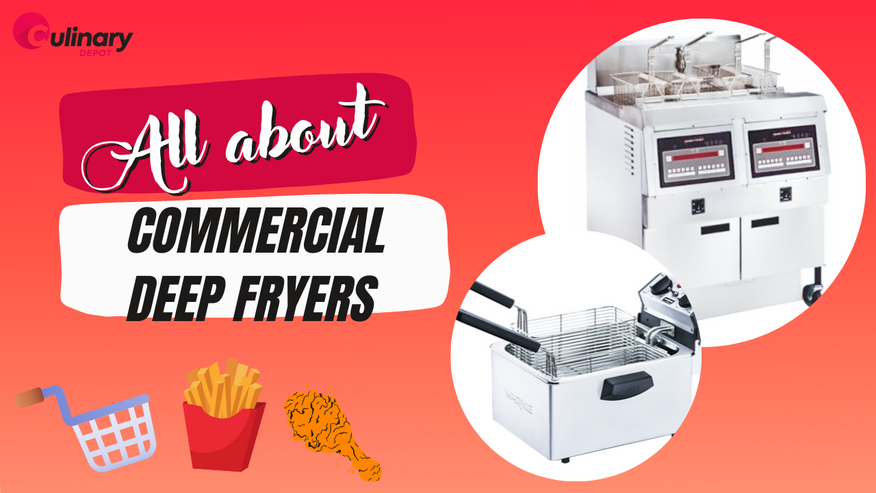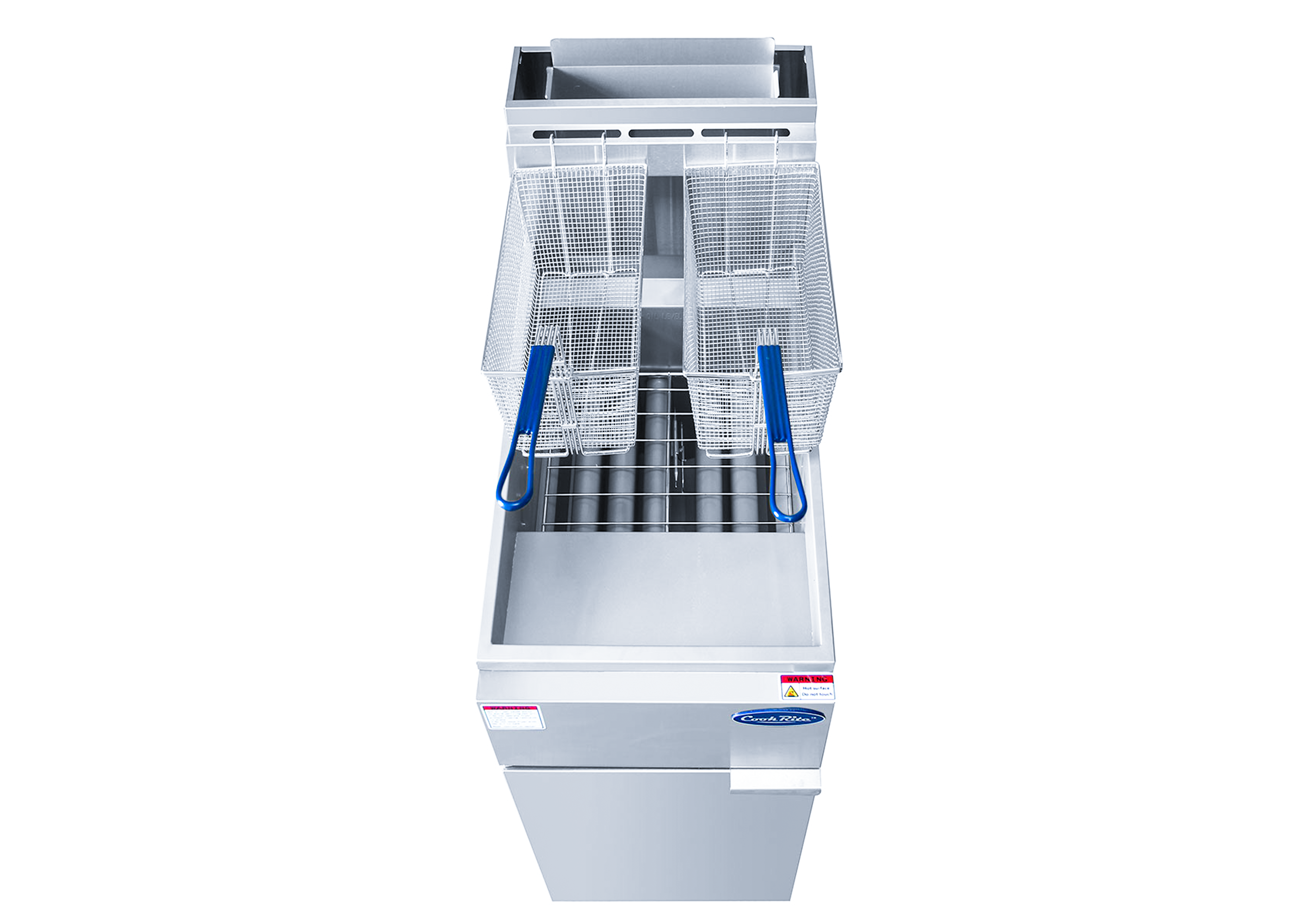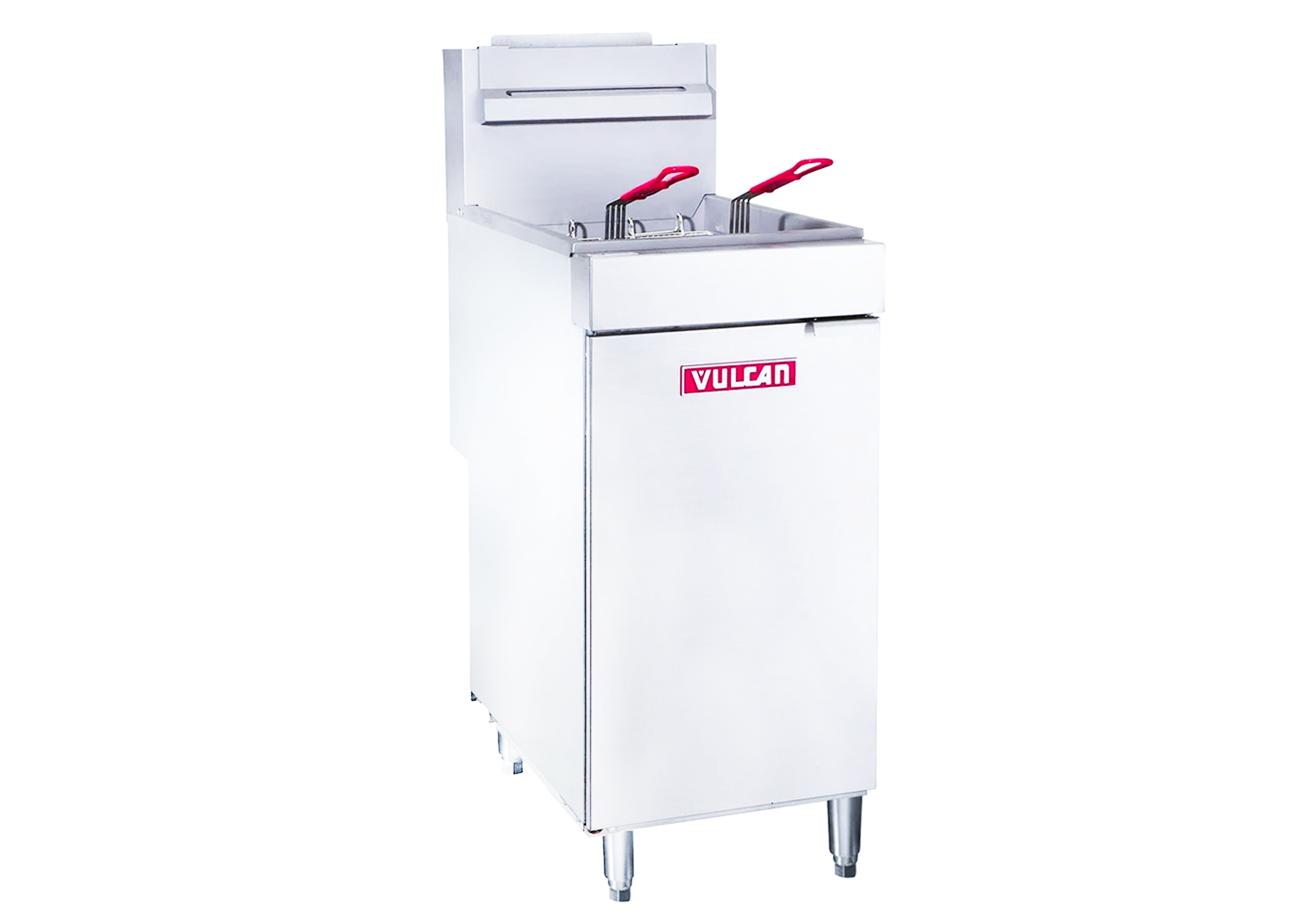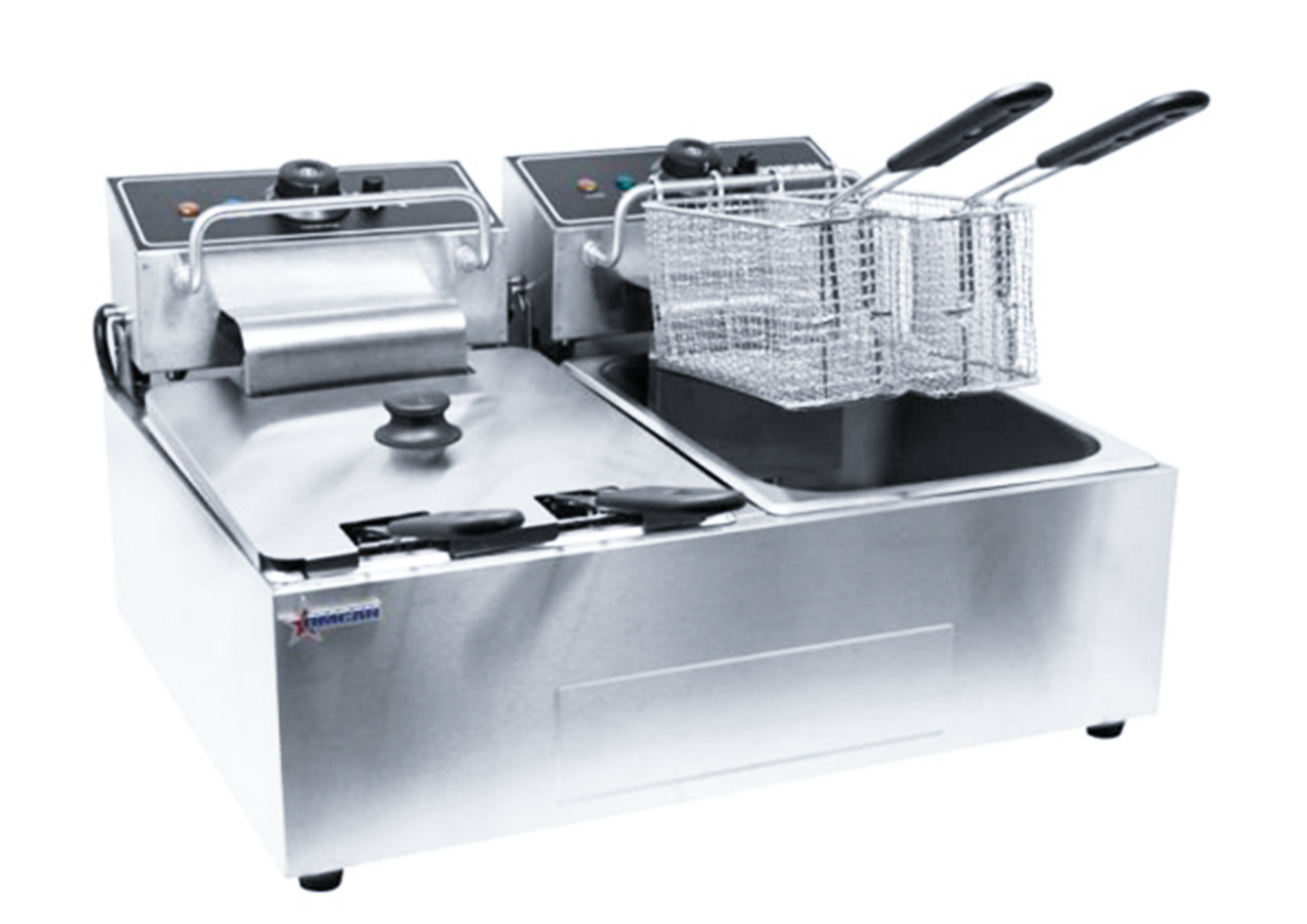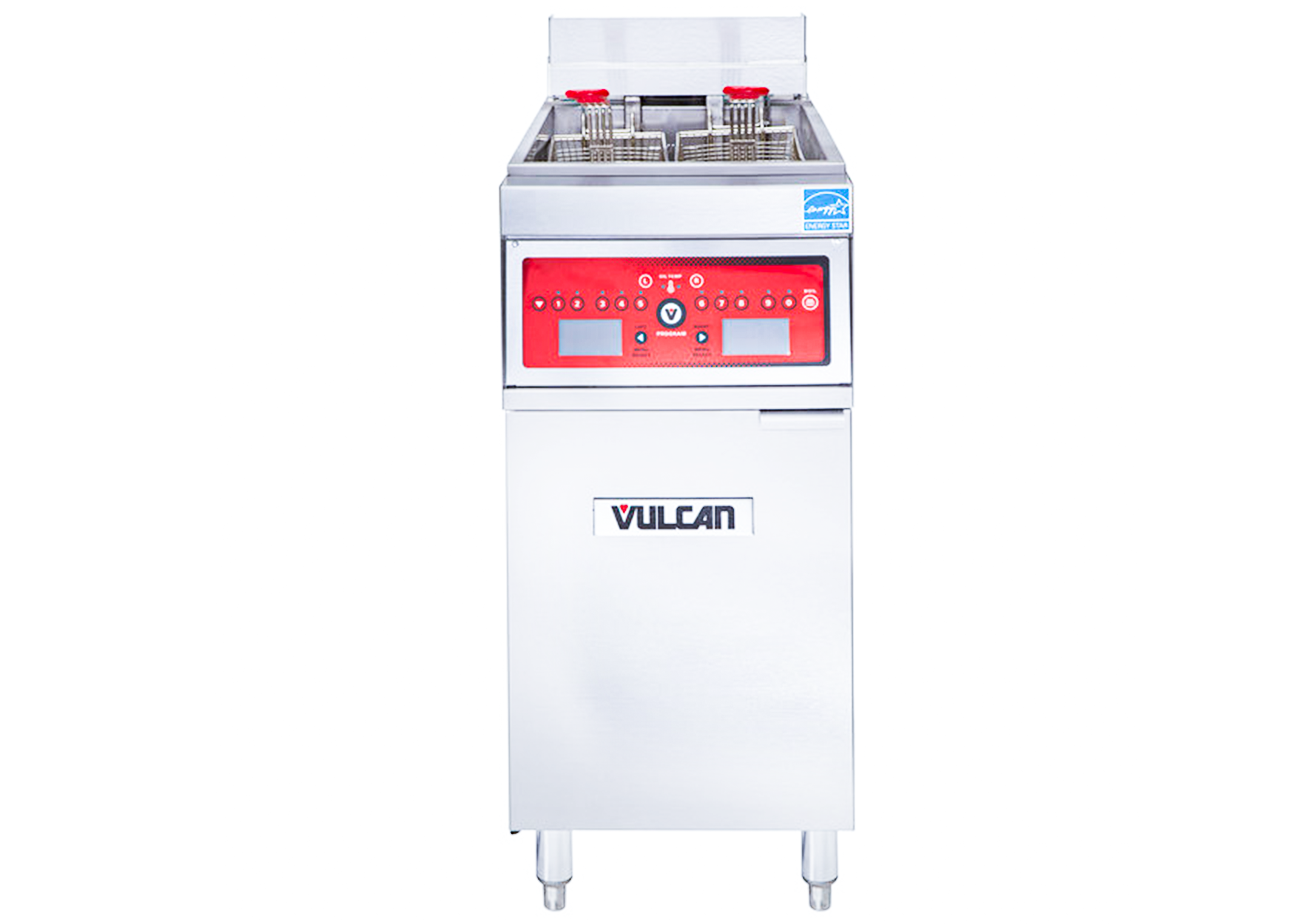Sep 5th 2022 - Monica Cunanan
Choose the Best Commercial Deep Fryer
Commercial kitchens use various types of deep fryers for different purposes. There are various kinds of fryers that work well for certain menus, spaces, and operators. The first and most essential thing to consider when thinking about adding a deep fryer to your kitchen is how it will be utilized. This article dives into what you should consider before purchasing one for your business.
How to Find the Best Fryers for Your Business?
Restaurants invest in their fryers just like they would in any other type of equipment. You need to make sure that you pick the right type of plan that fits your needs and your financial situation.
When buying a deep fryer, consider these features:
- Choose whether a Countertop or Floor Fryer is best for your space
- Power Source: Gas or Electric
- Type of Burner: Open, Pot Fryer Ribbon, Tube, or Flat Bottom
Most restaurants and fast food establishments could not function without industrial fryers. Regardless of whether you serve burgers and French fries or mozzarella sticks, your restaurant needs a commercial fryer for deep frying.
(See More: How to Troubleshoot Henny Penny Fryer)
What is a Fryer?
A commercial deep fryer is a kitchen appliance designed to heat large quantities of cooking oil for deep frying large quantities of foods such as french fries, funnel cakes, and mozzarella sticks.
How you use your commercial deep fryer depends on the specific model you have and also what kind of foods you're making. The basic method that is common among all types of deep fryers is to heat the oil to the desired temperature, lower the basket filled with battered food into the hot oil, and then raise the basket once the batter reaches a golden brown color. It is suggested that you drain the oil off your food on a platter lined with paper towels before serving so that customers don't receive excess grease on their plates.
Types of Commercial Deep Fryers
Choosing the right fryer depends on what fried items you're going to serve and whether they're popular. When choosing the best commercial deep fat fryers, consider their burners' styles because they're best suited for different types of menu items.
Commercial fryers come in two main types: countertop and Floor Fryers. Several different types of specialized fryers exist too.
The Difference: Countertop Fryers vs. Floor Fryers
If you're deciding between countertop fryers and traditional fryers, consider the size of your cooking space and how often you plan to use them.
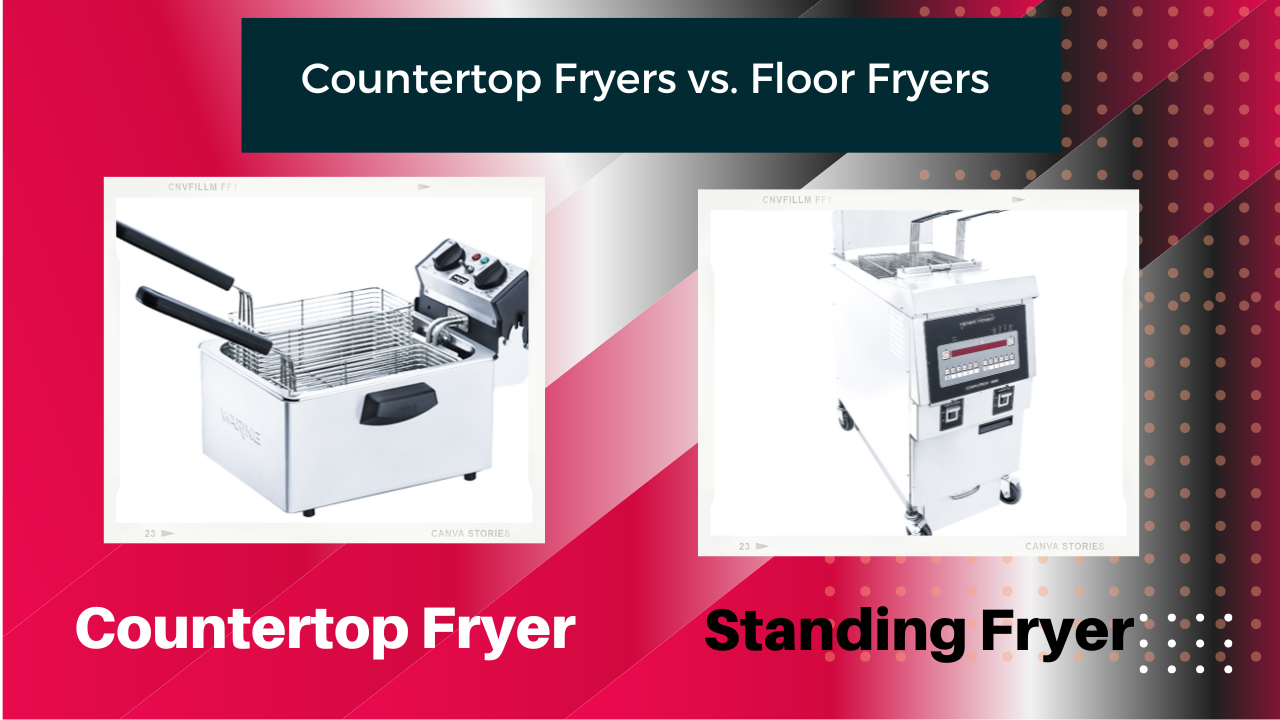
Countertop
A good countertop fryer will be able to save space without sacrificing performance. They're designed to be placed on top of your countertops, so they don't require any additional storage space.
There are also ventless models that provide advanced filtration for additional convenience and security.
Pros
- Small size for small footprint kitchens because of their space-saving, portable designs.
- Easy to use and easy to maintain
- Ideal for small restaurants and food carts.
- Countertop models available that feature ventless technology for improved convenience and safety
Cons
- May have difficulty keeping up with high-volume demand
Model Featured: Henny Penny OFG31, Waring WDF75RC
Floor Models
If you're selling large amounts of fries, then a floor fryer might be your best bet.
Floor models are ideal for high-volume operations because they're able to handle daily, consistent usage. They usually come with more advanced features to help speed up the cooking time.
Pros
- Best for fast-casual restaurants that serve large amounts of fried foods
- Ability to handle constant usage throughout the entire working week
- Typically recovers faster from heat exposure than countertop fryers.
Cons
- Most people will need hood ventilators.
- It may be difficult to fit into smaller kitchen spaces.
Specialty Fryers:
You'll also find a variety of specialties, from floor and countertop units to specialty designs for specific applications.
- Donut and funnel cake fryers: Funnel cakes and doughnuts need a specific kind of deep fryer (mostly ones with shallow pots) for best results. If you own a food cart or restaurant specializing in doughnuts or funnel cakes, this piece of equipment is indispensable for you.
- Ventless countertop models:
- Ideal for use in areas where there aren't any air conditioning units, like kiosks or fast-casual restaurants. These products have special filters that eliminate the need for traditional hood ventilators.
- Outdoor fryers: These units are mobile, gas-powered, and primed for outdoor use. If your restaurant offers catering, an outdoor model may be a necessity.
- Drop-in fryers: They're smaller than countertop models but they work in the same ways.
After deciding which type(s) of fryer you want, it’ll be time to think about the power supply.
Power Source

Gas Deep Fryer
Gas Deep Fryer is usually powered by natural gases (such as propane) or liquid propane tanks. Some commercial deep fryers have heating coils inside the pot.
Gas is usually considered more efficient and cheaper than electricity. They heat up very fast.
Gas fryers are hard to move because they need a natural gas line. It might cost a lot if you don't already have existing connections.
Pros
- Typically has more high capacity options and is the more common choice for high volume applications.
- Faster heat-up time and higher maximum temperature
- It provides a gentler heat transfer than electricity, resulting in the oils lasting longer.
Cons
- Typically installed in a specific place in your kitchen
- It may cost a lot to install without having existing connections.
- Usually harder to clean and maintain than electric models
Model Featured: Vulcan 1ER50D, Omcan Countertop
Electric Deep Fryer
The best commercial electric fryers are extremely efficient and easy to install These models have multiple heaters that come in direct physical touch with the frying oil. They recover faster between batches, and they're more mobile than traditional ovens because they don't require a gas line connection.
Electric models don't have as long a heating time as natural-fueled ones, but they can reach the same high temperatures.
Pros
- More energy efficient when frying and faster heat recovery between frying cycles.
- Not connected to the gas line, making them more portable
- Easy to install
- Ideal for small footprint kitchens, food trucks, carnivals, and pop-up restaurants
- Easier to clean than
Cons
- It takes longer to heat up
- Reduce maximum oil temperature
Burners
When buying commercial deep fat fryer, you will also want to consider the type of burners you‘ll require. They will largely depend upon the types of meals you're preparing.
You ideally want a deep fryer with multiple burners so that you can prepare different foods at once. If you use cooking oils for both frying chicken and french fry potatoes, they might end up tasting similar.
You could either change the oil every time you cook something else or use a different burner for each food item.
There are several different kinds of burners including:
Open Pot Fryer
Popular deep fryers for restaurants. Open pots are ideal for restaurants serving pre-breaded foods such as onion rings and flavored fried chicken because they have heating elements on their exteriors.
- Pros: They offer more cooking surfaces than conventional fryers, making them ideal for larger restaurants. They're also easier for cleaning and keep than other burners.
- Cons: They don't have long heating up times and aren't ideal for high sediment foods.
Ribbon
A fryer with ribbon-like elements along the bottom of the unit.
- Pros: They're quick to heat and have a short recovery time.
- Cons: The ribbon-like elements are difficult to clean. Foods that touch these elements may cause them to burn or scorch.
Tube
A tube fryer has tube pipe-like burners that carry gas inside the pot.
- Pros: They're ideal for cooking high-salt and heavily battered dishes.
- Cons: Fixed heating tubes make it difficult to clean.
Flat Bottom
A shallow fryer that delivers even heat distribution.
- Pros: It's shallow enough to cook low-density foods like fried potatoes, corn dogs, and deep-fried chicken wings. Because the heating element doesn't interfere with cleaning, it's much easier to clean than other types.
- Cons: Flat bottom fryers need more time to get hot than other models. They're not ideal for frying high sediment foods or large quantities of food at once.
Size and Durability
Size of Your Fryer
When buying a fryer, two other important factors to consider are its dimensions and its ability to withstand heat. When buying any new piece of equipment for your home, volume needs will always be an important consideration.
There are a variety of sizes when comparing fryer options.
- Fryers would usually have widths from 11” to 34,” and some even go up to 94”
- The Fryers would usually have capacities that can range all the way up to 500 lbs. The tank capacities are usually measured either in pounds or maximum oil volume.
- If you're running a large volume restaurant that fries a ton of foods, you can either buy one big fryer or get several smaller ones next to each other.
Durability
- Light-Duty Fryers: Suitable for low volume use. Ideal for fast-casual restaurants, convenience stores, and other small business owners who only fry a few items.
- Medium-Duty Fryers: Can handle more frequent use than light-duty batteries without losing their capacity.
- Heavy-Duty Fryers: Suitable for high-volume fryers used by fast food chains, food trucks, and other food businesses that specialize in fried dishes. These models are built for long life.
Cleaning and Maintenance
Like any other commercial kitchen appliance, commercial fryers need to be cleaned regularly to maintain their efficiency and meet sanitation requirements.
They're hard to clean because they tend to collect grease and grime. They're full of oil that needs to be regularly cleaned out. Oil can make cleaning the tank and the machine harder. Fried foods are greasy, messy affairs.
Look for fryers that are relatively easy to keep up with and maintain.
A good commercial fryer will help you cook better meals for your guests while making your kitchen more efficient. When selecting a fryer, consider your needs and preferences.
Additional Features: Advanced Controls and Options
- Programmable controls: Advanced operating systems allow for the sending of alerts when the preset cooking times expire, ensuring that you're always aware if the food has been cooked long enough.
- Oil filtration system: A filter will help maintain the quality of your used motor oils for longer periods of time, which means they'll last longer. Cleaner oil means tastier and prettier food.
- Energy-efficient models: Some energy-efficient units have a blower system that uses an electric motor to push or pull heat from combustion through the fryer. You don't need to rely solely on gas pressures to get the heat out of the tank. Other people have pre-mixed burner systems that mix specific ratios of gas and air to achieve high combustion efficiencies.
Getting Henny Penny Fryer for Your Business?
Commercial Fryer is crucial for operating any commercial kitchen. Here at Culinary Depot, we are eager to help you find the right one. May it be:
Visit our online store or contact us today for more information.

